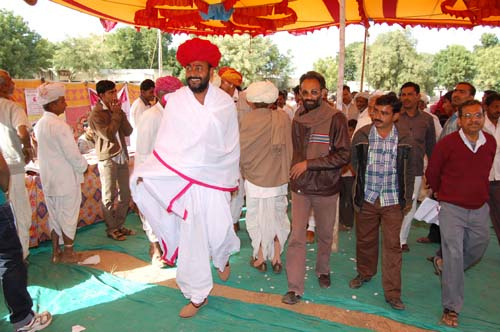NEW DELHI: His community — Rabaris, a livestock-dependent tribe traditionally-addresses him as “Bhopajj” or priest. He dresses up like a cow-herd himself: a long white cloth wrapped around his bare torso, red turban, dangling ear rings et al. With a lathi in tow, he walks into everywhere, even the chief minister’s office in Rajasthan.
Otaram Devasi, 48, happens to be the Rajasthan’s minister in charge of cow affairs. As for himself, India’s first-ever minister for the ‘divine’ bovine likes to address himself as ” gaupalan mantri”.
BJP and Vasundhara Raje had promised a separate ministry for cows in its poll manifesto. And when the party came to power with Raje as CM in December 2013, she promptly announced a ministry for the protection of cows, which was later transformed to a “department” after the move struck a constitutional hurdle since states can’t set up new ministries.
In October, 2014, Devasi was made minister of dairy and devasthan — administration of temples that get government funds — with the extra charge of the “gaupalan department”. His responsibility also includes overseeing Rajasthan’s Gau Seva Commission and Cow Conservation Directorate.
Three months into his tenure, Devasi says he is proud of what he has done with securing the future of cows in this desert state. And he believes he has set up a department for rest of India to emulate should any other state want to follow this ‘Rajasthan Model.
Devasi, who himself owns “20-25 cows”, wants the canvas for cow protection to be bigger. “I have sought an appointment with Prime Minister Narendra Modi after the Union budget so that I can impress upon him on the urgent need to set up a cow ministry at the Centre,” Devasi tells ET.
“I believe if cows have to be saved then every state in India must have separate ministries for cows,” he says, insisting that he’s not being just rhetorical. So what about buffalos, goats, even the state’s official animal, camel? Devasi dismisses the question, almost chiding you for being naive.
“Cows have a spiritual importance unlike other livestock animals. They must be protected at any cost. I would request Modiji to ban cow slaughter and, if need be, introduce strong legislation for that,” he says.
For Rajasthan, there are three things high on his agenda: clamping down on rampant cattle smuggling, introduction of a helpline number on the lines of 108 ambulance services to help cattle in distress besides starting a one-of-its-kind “sanctuary” for cows near Bikaner or Jaisalmer.
By sanctuary, he mans a protected area full of green grass not far from the desert so that the cows, especially those of the indigenous breed, can eat and live in peace.
Another day, another time, the 6-feet-1 inch-tall Devasi would have stood even taller among the Sangh Parivar stars. Long before “ghar wapsi” or Ram Mandir became fashionable causes for the typical Hindutva agitator, “gau raksha” was the first priority of the Sangh.
In fact, the only open public intervention ever done by the most powerful Sarsangchalak of RSS ever, MS Golwalkar, was on “gau raksha”.
by The Times of India































